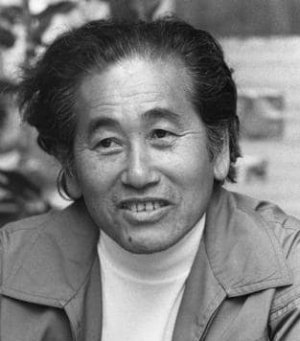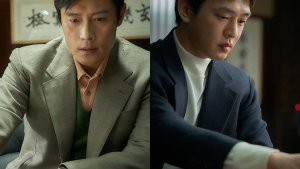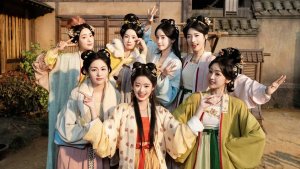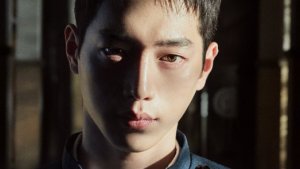Horikawa Hiromichi
- Name: Horikawa Hiromichi
- Native name: 堀川弘通
- Nationality: Japanese
- Gender: Male
- Born: November 28, 1916
- Died: September 5, 2012
Akira Kurosawa’s assistant on numerous films including Ikiru (1952) and Seven Samurai (Shichinin no samurai, 1954), Horikawa has never achieved his mentor’s fame. Kurosawa himself scripted his directorial debut, A Story of Fast-Growing Weeds (Asunaro monogatari, 1955), about an adolescent and the first three women in his life. A concern with youthful experience was also visible in Horikawa’s second and third films, Summer Eclipse (Nisshoku no natsu, 1956), a taiyōzoku (“sun tribe”) film based on a Shintarō Ishihara novel, and The Last Day of Oishi (“Genroku Chūshingura: Ōishi saigo no ichinichi” yori: Koto no tsume, 1957), a reworking of the Chūshingura story that focused particularly on the youngest of the participating ronin and his fiancée. Another retelling of a classical Japanese story was the Chikamatsu adaptation Oil Hell Murder (Onnagoroshi abura jigoku, 1957), but Horikawa returned to contemporary subject matter with The Naked General (Hadaka no taishō, 1958), a portrait of mentally handicapped collage artist Kiyoshi Yamashita. In this darkly humorous account of a stubborn non-conformist, Horikawa touched for the first time on the subject of World War II, ironically showing how the artist’s apparent madness enabled him to escape the draft. The melodrama Eternity of Love (Wakarete ikiru toki mo, 1961), tracing a woman’s unhappy marriages and affairs, also unfolded against a wartime backdrop.
During the sixties, Horikawa made several thrillers: the socially conscious aspects of these films suggest the continuing influence of Kurosawa while also evoking Masaki Kobayashi, whose regular actor Tatsuya Nakadai appeared in TheBlueBeast (Aoiyajū, 1960) and PressureofGuilt (Shirotokuro, 1963). The former charted the rise and fall of a low-ranking executive who exploits both labor and management, while the latter was a tangled psychological thriller about an attorney who, having strangled his lover, faces a moral dilemma when another man confesses. Later, GoodbyeMoscow (SarabaMosukuwagurentai, 1968) used the relationship between a Japanese jazz pianist, an American soldier on leave from Vietnam, and a group of young Russian dissidents as a metaphor for Japan’s situation in the Cold War era. TheMilitarist (GekidōnoShōwashi:Gunbatsu, 1970) was a critical biopic of General Tōjō, which dramatized the military coup of February 26, 1936, while SunAbove,DeathBelow (Sogeki, 1968) was a conventional if snappily edited thriller about a doomed hitman.
By this time, Horikawa was considered Toho’s most reliable director of prestige material, but his seventies work was less noteworthy. He continued to deal with youthful experience in Have Wings on Your Heart (Tsubasa wa kokoro ni tsukete, 1978) and Song of Mutsuko (Mutchan no uta, 1985), both tragedies about terminally ill children. The latter again had a wartime backdrop, as did Horikawa’s last films: War and Flowers (Hana monogatari, 1989) was another account of female experience during the war years, while Asian Blue (Eijian Burū: Ukishima Maru sakon, 1995) focused on the sufferings of Korean forced laborers, in particular those killed in the sinking of a ship carrying them home after Japan’s surrender. Though Horikawa worked consistently with interesting subject matter, his films seem to have been imperfectly realized: Anderson and Richie condemned A Story of Fast-Growing Weeds for not fully developing Kurosawa’s script, Tadao Satō found Goodbye Moscow sentimental despite its political interest, and Joan Mellen criticized The Militarist for political naivety. Nevertheless, some of Horikawa’s films were considered worthy of foreign distribution in the sixties, and they may still merit revival.
(Source: A Critical Handbook of Japanese Film Directors) Edit Biography
Director
| Title | Rating |
|---|---|
| Asian Blue | 8.0 |
| The Alaska Story | 2.0 |
| Kokuso Sezu | 0.0 |
| Osho | 0.0 |
| The Militarists | 2.0 |
| Saraba Moscow Gurentai | 0.0 |
| Youth of the Beast | 7.3 |
| Shiro to Kuro | 0.0 |
| Musume to Watashi | 2.0 |
| Musume to Watashi | 4.0 |
| Knock Down | 7.0 |
| The Naked General | 0.0 |
| Tomorrow I'll Be a Fire-Tree | 0.0 |
Screenwriter & Director
| Title | Rating |
|---|---|
| Tsubasa wa Kokoro ni Tsukete | 2.0 |
| Eternity of Love | 0.0 |
Assistant Director
| Title | Rating |
|---|---|
| Ikiru | 8.2 |
Trending Articles
Chinese Actor Zhang Ling He urges sasaeng fans to stop invading his privacy
Zhang Ling He addresses sasaeng fans in a social media post, urging them to stop stalking, following his car, and invading his privacy
Song Joong Ki tears up over box office failure of 'Bogota'
Song Joong Ki's Bogota: City of the Lost underperforms at the domestic box office
'When the Phone Rings' sparks outrage for misrepresentation of Israel-Palestine conflict
A scene from the final episode of When the Phone Rings sparks outrage among international viewers
Park Bo Young, Choi Woo Shik's Netflix K-drama 'Melo Movie' announces premiere date
The Netflix series Melo Movie is coming soon
Yang Zi's 'Flourished Peony', Bai Lu's 'Moonlight Mystique' among top airing dramas in China
Here are the top currently airing C-dramas of January 2025
Yoo Ah In's film 'The Match' is under discussion for release
Actor Yoo Ah In's film The Match, whose release was postponed indefinitely due to the actor's drug use controversy, is currently under discussion for release
Chinese drama 'Perfect Match' announces premiere date
The upcoming Chinese historical comedy drama Perfect Match is coming soon
'Undercover High School' unveils Seo Kang Joon's first look from the K-drama
MBC Friday-Saturday drama Undercover High School gives a glimpse of Seo Kang Joon going undercover as a high school student


















